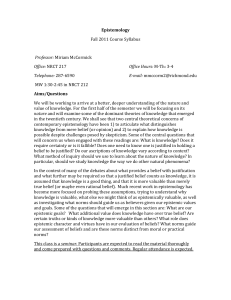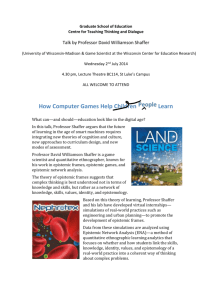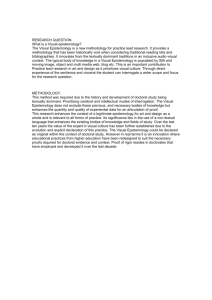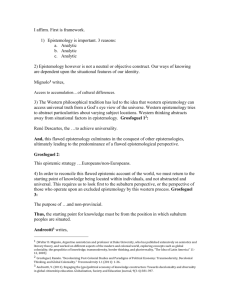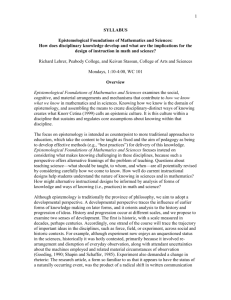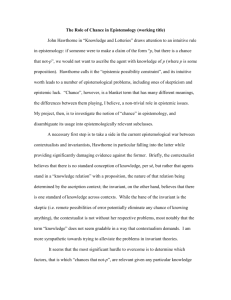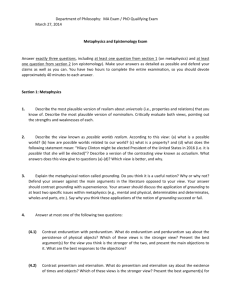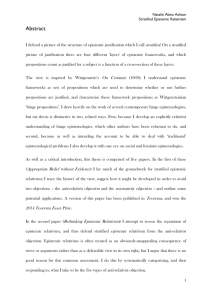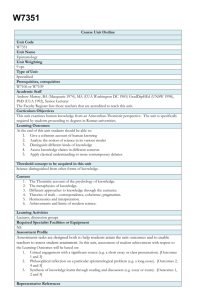Part of an unpublished paper for the Invited Symposium on
advertisement
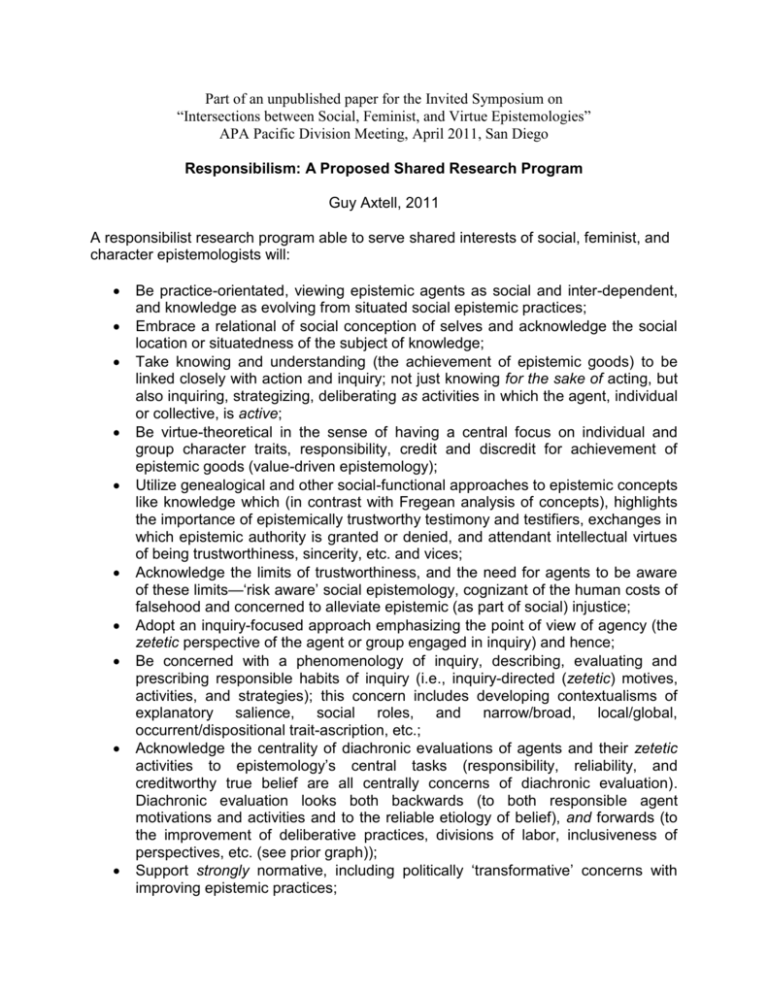
Part of an unpublished paper for the Invited Symposium on “Intersections between Social, Feminist, and Virtue Epistemologies” APA Pacific Division Meeting, April 2011, San Diego Responsibilism: A Proposed Shared Research Program Guy Axtell, 2011 A responsibilist research program able to serve shared interests of social, feminist, and character epistemologists will: Be practice-orientated, viewing epistemic agents as social and inter-dependent, and knowledge as evolving from situated social epistemic practices; Embrace a relational of social conception of selves and acknowledge the social location or situatedness of the subject of knowledge; Take knowing and understanding (the achievement of epistemic goods) to be linked closely with action and inquiry; not just knowing for the sake of acting, but also inquiring, strategizing, deliberating as activities in which the agent, individual or collective, is active; Be virtue-theoretical in the sense of having a central focus on individual and group character traits, responsibility, credit and discredit for achievement of epistemic goods (value-driven epistemology); Utilize genealogical and other social-functional approaches to epistemic concepts like knowledge which (in contrast with Fregean analysis of concepts), highlights the importance of epistemically trustworthy testimony and testifiers, exchanges in which epistemic authority is granted or denied, and attendant intellectual virtues of being trustworthiness, sincerity, etc. and vices; Acknowledge the limits of trustworthiness, and the need for agents to be aware of these limits—‘risk aware’ social epistemology, cognizant of the human costs of falsehood and concerned to alleviate epistemic (as part of social) injustice; Adopt an inquiry-focused approach emphasizing the point of view of agency (the zetetic perspective of the agent or group engaged in inquiry) and hence; Be concerned with a phenomenology of inquiry, describing, evaluating and prescribing responsible habits of inquiry (i.e., inquiry-directed (zetetic) motives, activities, and strategies); this concern includes developing contextualisms of explanatory salience, social roles, and narrow/broad, local/global, occurrent/dispositional trait-ascription, etc.; Acknowledge the centrality of diachronic evaluations of agents and their zetetic activities to epistemology’s central tasks (responsibility, reliability, and creditworthy true belief are all centrally concerns of diachronic evaluation). Diachronic evaluation looks both backwards (to both responsible agent motivations and activities and to the reliable etiology of belief), and forwards (to the improvement of deliberative practices, divisions of labor, inclusiveness of perspectives, etc. (see prior graph)); Support strongly normative, including politically ‘transformative’ concerns with improving epistemic practices; Acknowledge positive interplay between naturalism and normativity, and fact/value, and epistemology/ethics ‘entanglements’ while resisting the confusions and reductionisms that don’t allow us to maintaining these distinctions; Support liberal democratic theory, individual and group deliberative virtues, and the epistemic benefits of collective inquiry and of broadly inclusive deliberative practices; Support an ‘ethics of belief’ and ‘epistemology of disagreement/diversity’ that respects Rawlsian “reasonable pluralism” and that supports the reality of reasonable disagreements among epistemic peers. Rational agency plus shared evidence on large issues does not always or even typically result in consensus; Acknowledge the personal value of the virtues, and even while critiquing traditional epistemology, avoid confusing the pursuit of projects that turn on personal value or that essentially serve to expand epistemology and ethics, with claims that such projects must ‘replace’ or ‘supplant’ traditional epistemological or ethical concerns. Seek greater unification of epistemology and ethics via analogy and via general theory of value, but not via reductionism. Adopt a model of the relationship between fact and value that acknowledges a degree of ‘entanglement’ sufficient to reject reductionism and to support the importance of thick evaluative and axiological concepts. Encourage a ‘thickening’ of epistemology by way of thick descriptions of epistemic concepts (trustworthiness, conscientiousness, etc.) and their role in deliberation and in our cognitive ecology; encourage a rejection of the ‘centralist’ thesis of the epistemic primacy of ‘thin’ concepts such as ‘justified,’ ‘warranted,’ ‘rational,’ etc. Find an epistemology of the ‘right thickness’ or the right balance of thin/thick explanatory and normative interests. ???


